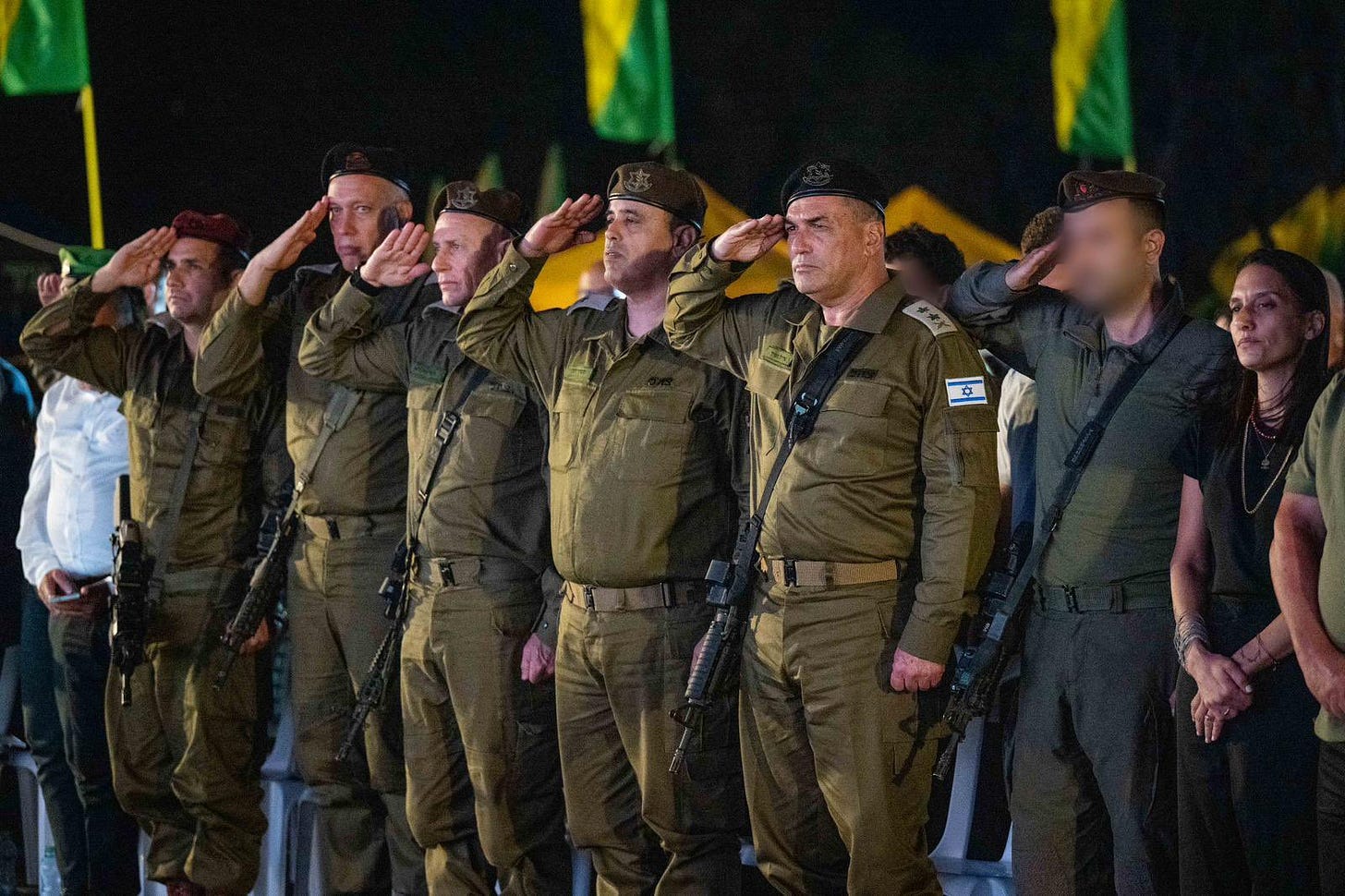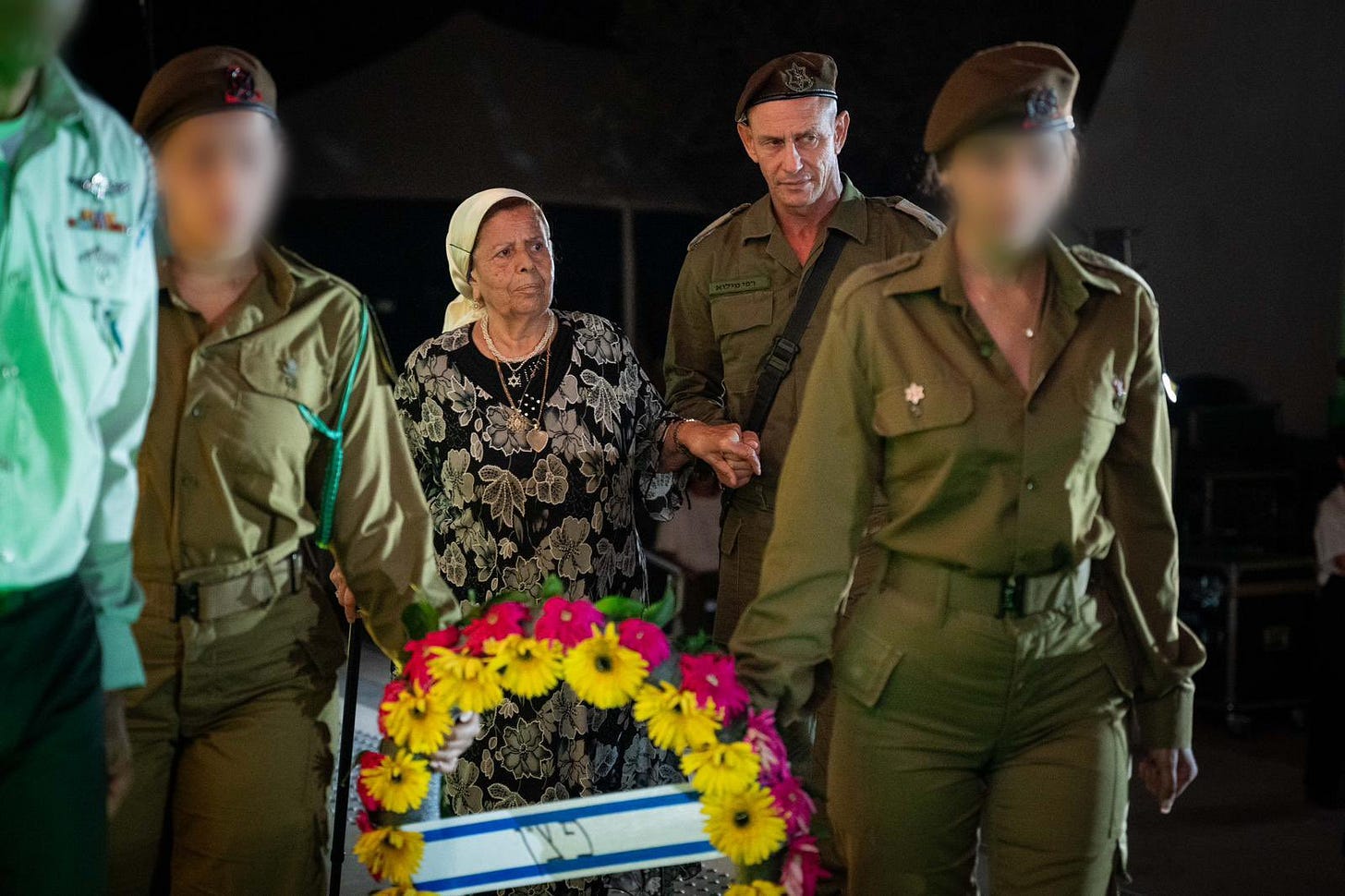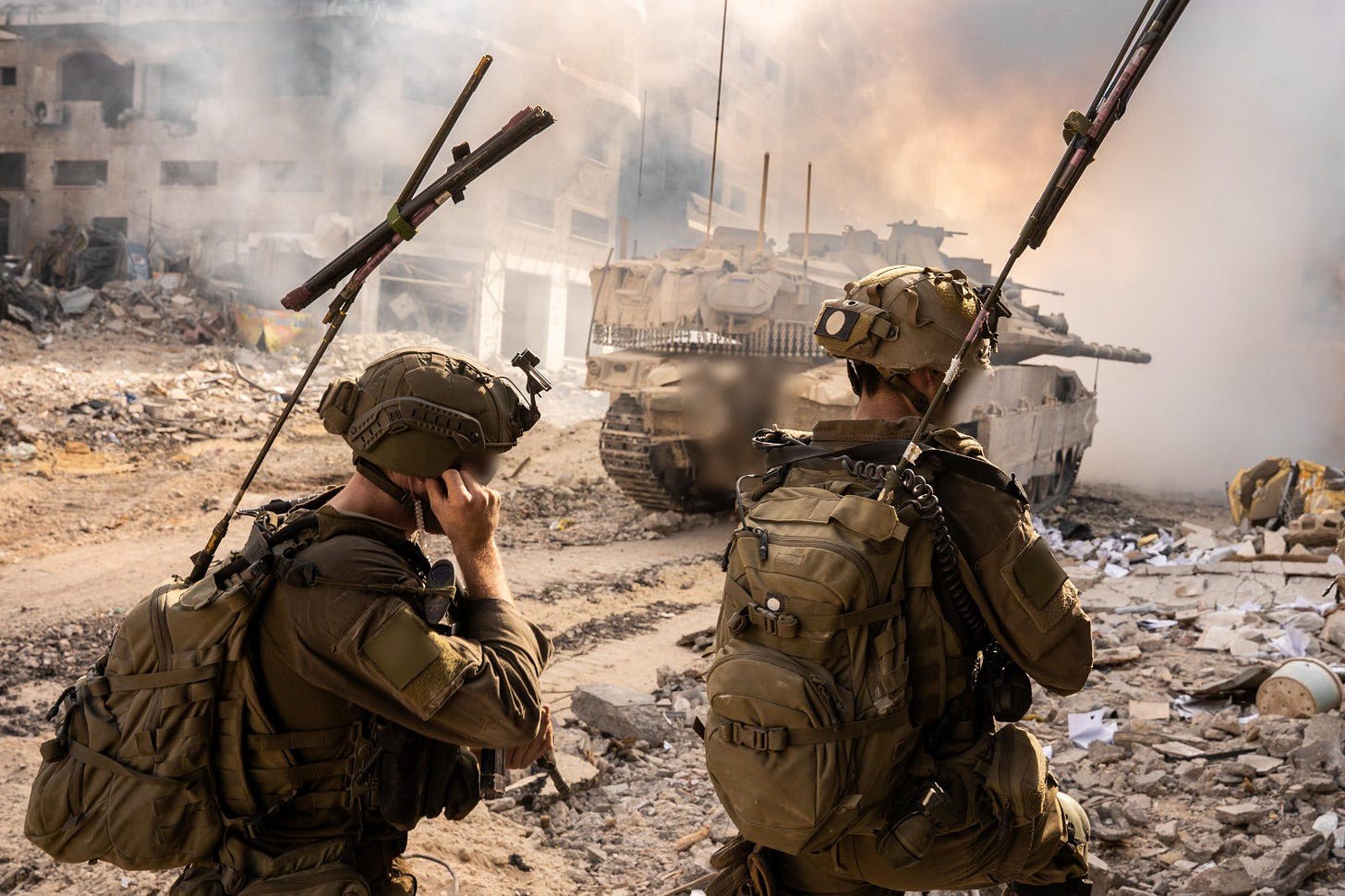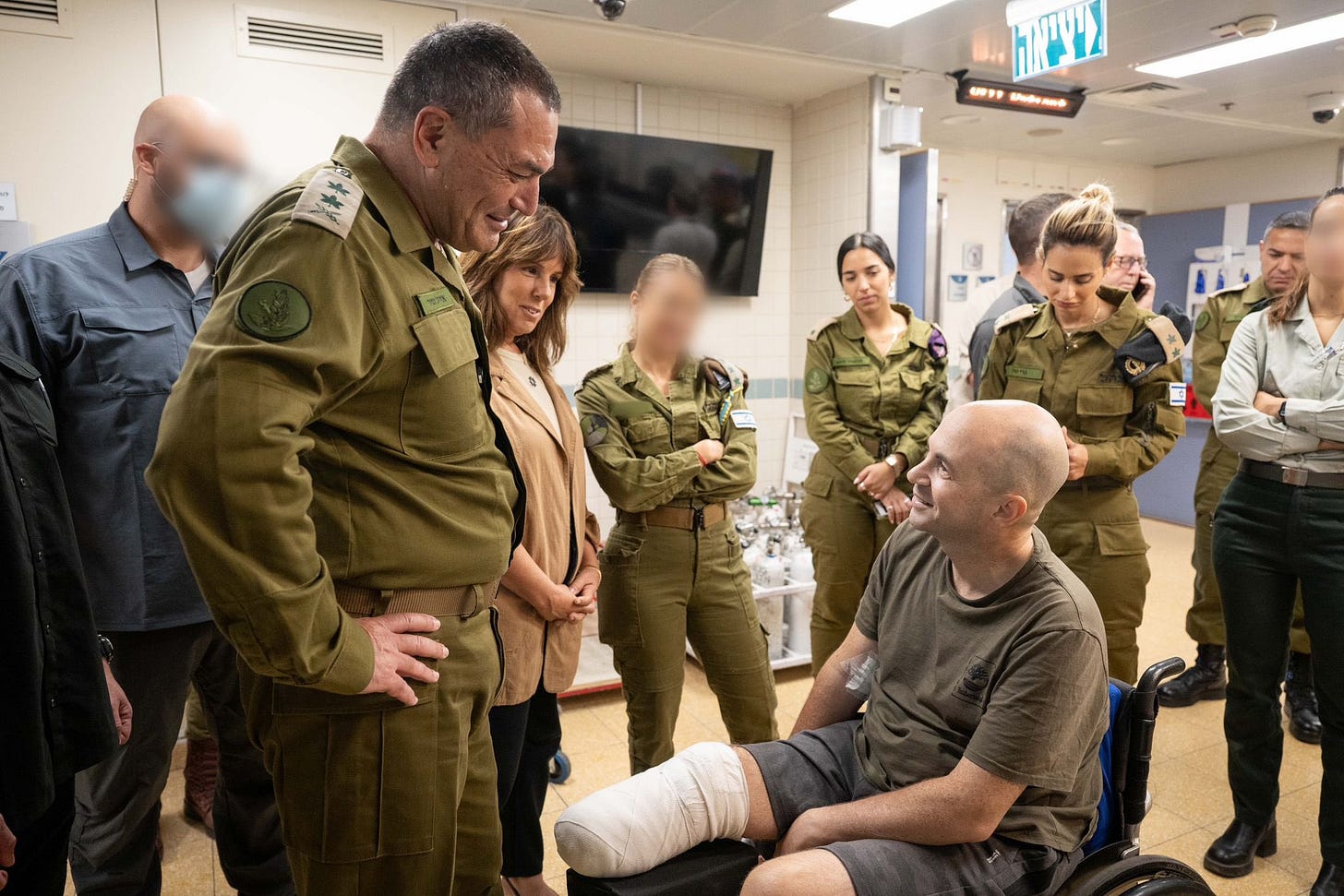A Salute to the Men and Women Who Keep Israel Alive
In the IDF, we see the Jewish story itself — because, when Israelis fight, they fight for life.
Please consider supporting our mission to help everyone better understand and become smarter about the Jewish world. A gift of any amount helps keep our platform free of advertising and accessible to all.
You can also listen to the podcast version of this essay on Apple Podcasts, YouTube Music, YouTube, and Spotify.
In the two years since October 7, 2023, Israel has lived through one of the most painful and heroic chapters in its history.
The seven-front war with Hamas and its allies has tested not only the strength of the Israel Defense Forces, but the very soul of the nation. Every inch of Israel’s security, every ounce of its resilience, has been carried on the shoulders of men and women in uniform — soldiers who left their families, their careers, their daily routines, and their comforts to defend their homeland.
Israel’s toll in this war stands at 472 fallen heroes, among them two police officers and three Defense Ministry civilian contractors. But behind that number are thousands more who carry wounds, seen and unseen. There are parents who buried their children, children who will grow up without parents, and a nation forever changed by the sacrifices made in the defense of life itself. Each of those 472 names is a universe. Each was someone’s son, daughter, sibling, or best friend. Each represented the unbreakable link between the State of Israel and the Jewish people.
When the call went out for reservists in the immediate days that followed October 7th, hundreds of thousands answered. They came from every corner of Israeli life — engineers, artists, doctors, teachers, startup founders, musicians, and students. Some were abroad and dropped everything to fly home. Others packed their bags in the middle of family dinners or business meetings and kissed their loved ones goodbye without knowing when, or if, they’d return. They left behind newborns, elderly parents, companies they’d built, dreams they’d been chasing. And they did it without hesitation. Because, in Israel, the army is not just an institution; it’s part of the family.
Many of my own friends were called into reserves. Men and women I shared Shabbat dinners with, people whose weddings I danced at, whose children I played with, who laughed with me over a beer — suddenly they were back in uniform, carrying weapons instead of laptops, sleeping in army base beds instead of their own.
It is impossible to describe to an outsider what that feels like. The helplessness. The waiting. The constant checking of the news, multiple times a day, holding your breath as new photos of fallen soldiers appear, hoping you don’t see a familiar face. In Israel, every casualty announcement feels personal, because it almost always is. The distance between “a soldier fell” and “someone I know fell” is heartbreakingly thin.
And behind those soldiers stood mothers — mothers whose hearts broke twice. Once when they sent their children into the army the first time, and again when they watched them go back years later, as reservists, now husbands and fathers themselves. These mothers, who raised their sons and daughters through sirens and fears, found themselves reliving the same anguish all over again. They packed their children’s bags, kissed their grandchildren goodbye, and stood at the doorway with trembling hands and tearful eyes, praying for the strength to let go once more.
Their courage is quiet but immense, the courage of women who have carried generations of Jewish history on their backs, who have lived through the unthinkable and yet still believe in tomorrow. It is the unique anguish and strength of the Israeli mother: to know the cost of life in Israel and still choose to give life to it.
But the IDF does not fight alone. Behind every soldier stands a nation that mobilized as one. Parents turned their homes into logistics hubs; volunteers packed meals and collected supplies; schoolchildren wrote letters to soldiers they’d never met. The lines between the front and the home front blurred — because, in Israel, there is no such thing as “someone else’s war.” When the army goes to battle, the nation goes with it.
That sense of collective duty, and collective vulnerability, is the DNA of the IDF. It’s what makes it different from any other army in the world. The IDF was born not to conquer, but to defend a people who had known statelessness and vulnerability for 2,000 years. Every soldier carries that memory, whether consciously or not.
The IDF’s ethos is built on three pillars: courage, responsibility, and solidarity. Courage not only to fight, but to make moral choices in the fog of war. Responsibility not only to defend the nation, but to safeguard its humanity. Solidarity not only with comrades-in-arms, but with the entire people of Israel. Every citizen, every community, every child.
And that solidarity extends far beyond Jews. The IDF is not just a “Jewish army”; it is the army of Israel. Serving within its ranks are Jews, Christians, Druze, Bedouins, and Muslims. Shoulder to shoulder, they defend the same land, the same skies, the same people. Christian and Muslim Arabs serve in combat units, Bedouin trackers risk their lives hunting terrorists in the desert, Druze officers command battalions.
Their loyalty is not measured by religion but by shared purpose: the defense of a homeland that protects freedom and human dignity for all. In their unity lies one of Israel’s quiet miracles: that a country so small and so diverse can forge such unity under fire.
In Israel, when something happens — when there’s a threat, a terror attack, a disaster — people don’t ask, “Where’s the police?” They ask, “Where’s the army?” Because the IDF is more than a military; it is the heartbeat of the country. It is there in times of war and peace, in search-and-rescue missions, humanitarian operations, and natural disasters. It is the first responder, the last line of defense, and the constant reminder that the Jewish People will never again be helpless.
And there is something else, something that defines the moral line between Israel and its enemies. When Israelis lose soldiers, we call them heroes. When our enemies lose fighters, they call them martyrs. Do you see the difference? Our heroes die protecting life. Their people die pursuing death. Our soldiers fall shielding civilians; theirs fall hiding behind them. We mourn our dead with tears; they celebrate theirs with parades.
That difference — between a nation that sanctifies life and one that glorifies death — is not a detail. It is the very heart of this conflict. The IDF fights to live. Hamas and its patrons fight so others will die.
Perhaps nowhere was that moral struggle more visible than in one of the most heartbreaking moments of the war: when Israeli soldiers, in the chaos of battle, accidentally killed three Israeli hostages who had escaped captivity in Gaza. It was an unspeakable tragedy, a moment that shook the entire country to its core. These soldiers, already burdened with the impossible weight of combat, suddenly had to carry a pain beyond words.
But what happened next revealed the soul of Israel. One of the hostages’ mothers, instead of expressing anger, went straight to the soldiers. She told them she did not blame them. She praised them for defending the country, for risking their lives to bring others home. In her grief, she gave them grace. In her heartbreak, she reminded all of Israel that the IDF’s fight is not against the innocent, but for the innocent. That moment captured the essence of who we are: a people who mourn our mistakes even as we honor the purity of the intent behind every act of defense.
Many of the soldiers who fell were barely adults, boys and girls who should have been in university lectures, on first dates, or planning trips after the army. Instead, they carried a nation’s safety on their shoulders. They are young in age, but ancient in spirit, heirs to generations who understood that freedom has never been free for the Jewish People.
Behind each of them stand families who carry a burden that words can never ease. They are the quiet heroes who keep living when the world has moved on — lighting candles, visiting graves, keeping the memory of their sons and daughters alive. In their strength, Israel finds its moral compass. They remind us that every soldier’s life was not only lost; it was given.
For soldiers who served in Gaza, the war has been more than a military campaign; it has been a confrontation with the darkest evil. They fought in tunnels and ruins, in cities turned to rubble by the cruelty of those who hide behind civilians and children. They rescued hostages, recovered the bodies of friends, and witnessed horrors that words cannot ain.
Yet, evmid that darkness, they upheld the values that make Israel what it is: striving to protect innocent life, delivering aid even to enemy civilians, and maintaining their humanity when others had abandoned theirs.
The children who watched their fathers and mothers don uniforms these past two years will one day wear their own. They will remember the stories, the courage, the songs sung in the bases, the names whispered at memorials. And when their time comes, they will step forward — not out of hate, but out of love. Because in Israel, to serve is to protect the miracle of life.
During the war, I visited wounded soldiers in the hospital — young men lying in beds with shrapnel wounds, burns, and missing limbs. I expected sadness. What I found instead was a fierce, almost defiant spirit. Every one of them, without exception, said the same thing: “I just want to get back to my unit.” They weren’t thinking about medals or recognition; they were thinking about their brothers and sisters still fighting in Gaza.
Even in pain, even bandaged and broken, they were eager to return to the front lines. There is something indescribable about that kind of courage, the kind born not from glory, but from love. Love of country. Love of comrades. Love of life.
The IDF is not just a defense force; it is a moral force. It stands as a living refutation of the lie that power and ethics cannot coexist. In a region where brutality is often glorified, the IDF has shown that strength can serve compassion, and that the sword of Israel can be wielded with restraint, not vengeance. The soldiers of the IDF did not just defend a country; they defended a principle: that Jews have the right to live freely, safely, and proudly in their own land.
The IDF is the living continuation of a 4,000-year story. The same people who once wandered powerless through the deserts of exile now defend their homeland in uniform, guided by the same ancient faith in life, justice, and hope. Every Israeli soldier is a link in that unbroken chain — from David to today. They stand not only for a country, but for the eternal right of the Jewish People to exist in peace and dignity.
To the soldiers who fought, to the reservists who returned home changed, to the families who bore the weight of absence and fear, to the parents who found the strength to say goodbye again, to the medics, engineers, intelligence officers, and volunteers who made survival possible — Israel owes a debt that cannot be repaid.
The story of the IDF is the story of a people who refuse to give up on life, who turn grief into unity, who fight not for conquest but for existence. And though the cost has been unbearably high, their sacrifice ensures that the light of Israel continues to burn bright.
May the memory of the fallen be a blessing. May the wounded find healing. And may the living carry forward their legacy with pride, strength, and the unshakable conviction that Am Yisrael Chai — the Nation of Israel lives.






Absolutely right!! I admire the IDF so much. They make huge sacrifices, as do their families. The IDF has a strict moral code and personally I believe they are one of the best Armies in the world. I salute them.
Your writing kept me reading through heartfelt tears and love for these heroes! Each and every ones! The soldiers, their families, and all Israelis!! 💙🤍💙🤍🇮🇱🫶🏻💪🏻Am Yisrael Chai!